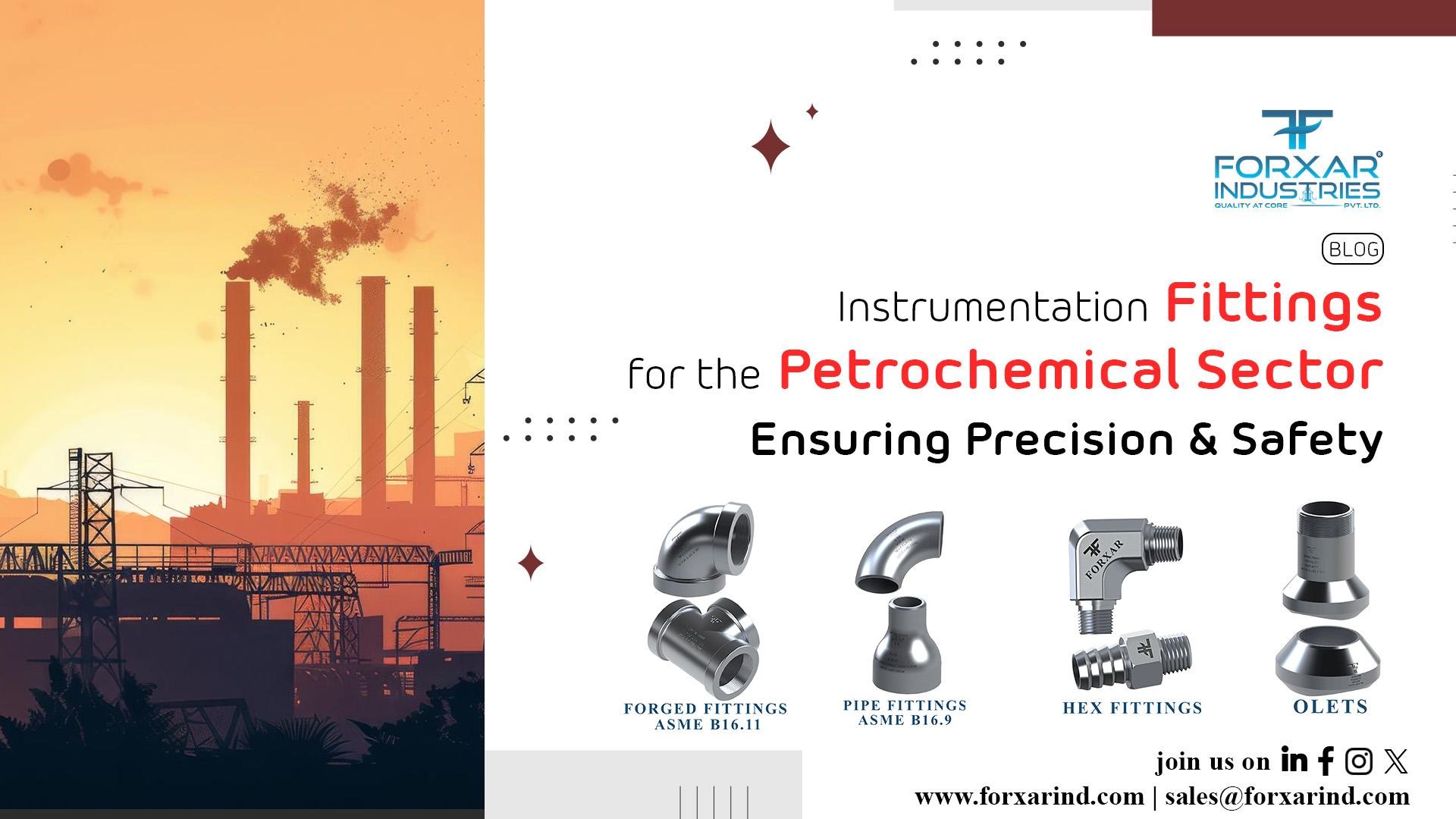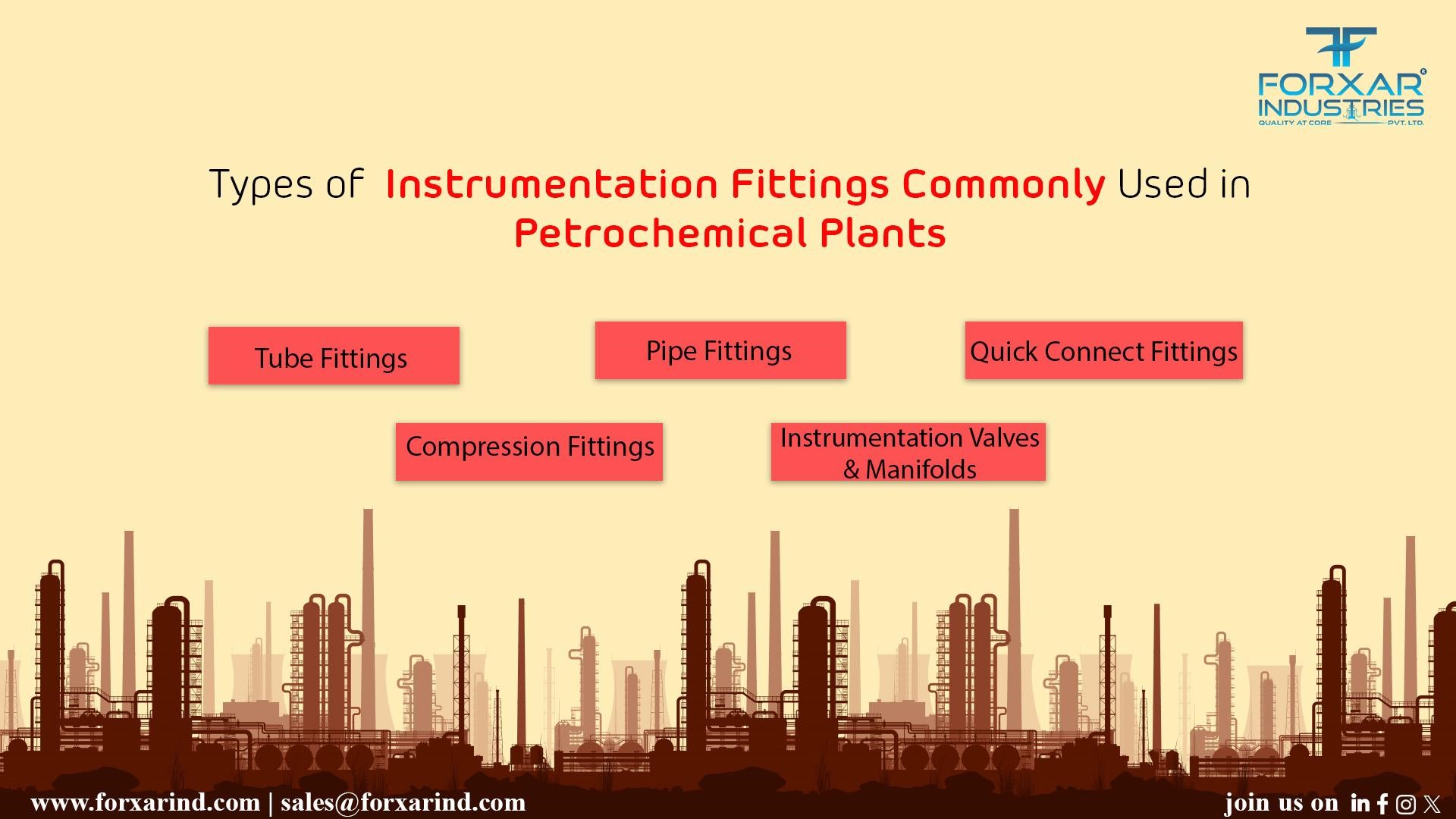
Instrumentation Fittings for the Petrochemical Sector: Ensuring Precision and Safety
The Petrochemical Industry is the backbone of modern Industrial Development, transforming raw Hydrocarbons into a range of products essential to everyday life, from Plastics to Fertilizers. Given the complexity and critical nature of processes in this sector, the importance of Precision, Safety, and Reliability in every component of the infrastructure cannot be overstated. Among these Crucial components are Instrumentation Fittings, which play a vital role in Controlling and Monitoring process flows and other critical parameters like Pressure, Temperature etc.
In this blog, we will explore the significance of Instrumentation Fittings in the Petrochemical Industry, the types of Fittings commonly used, and why Quality matters in such High-Stakes Environments.
The Role of Instrumentation Fittings in the Petrochemical Industries/Refineries
Accessories such as Check Valves(NRV), Filters, and Regulators play a crucial role in maintaining optimal system performance. High-Quality Components ensure “precise Control over Flow Rates, Pressure”, and other variables, leading to more efficient operation. This not only maximizes the “performance of your equipment but also Contributes to Energy savings and Reduced Operational costs.”
Given the demanding environments of Petrochemical Plants, where Extreme Temperatures, High Pressures, and aggressive Chemicals are routine, Instrumentation Fittings must withstand these harsh conditions while maintaining Leak-proof Connections. Even the smallest Leak or Inaccurate measurement could lead to safety hazards, operational inefficiencies, or costly downtime.

Types of Instrumentation Fittings Commonly Used in Petrochemical Plants
The Several types of Instrumentation Fittings are used in Petrochemical applications, each suited for different functions and operational conditions. The selection of the Right Fitting depends on the specific needs of the application, such as Pressure Levels, Temperature Range, and Fluid Type.
1. Tube Fittings
Tube fittings are widely used in fluid control systems. They offer secure, leak-tight connections and are designed to handle high pressures and temperatures. Commonly made from stainless steel or other corrosion-resistant alloys, tube fittings are preferred for their durability and reliability in hostile environments.
2. Pipe Fittings
Pipe fittings serve the purpose of connecting pipes of different sizes or diameters. In Petrochemical Plants, Pipe Fittings must resist corrosion and wear caused by the chemicals flowing through them. These fittings include Elbows, Tees, Reducers, and Unions, all designed to adapt to specific Flow conditions and space constraints.
3. Compression Fittings
Compression Fittings are frequently used for connecting tubing or pipes in systems where disconnection and reconnection are needed for maintenance or equipment changes. These Fittings use compression to form a Tight Seal without welding, making them a practical choice for Quick Installations in the Petrochemical sector.
4. Instrumentation Valves and Manifolds
Instrumentation Valves, such as Ball Valves, Needle Valves, and Manifolds, work in tandem with fittings to control the flow of gases or liquids in a system. Manifolds allow Multiple Instruments to be connected to a Single Pressure source, reducing the number of connections and potential leakage points in the system.
5. Quick Connect Fittings
In applications requiring Frequent Connections and Disconnections, Quick Connect fittings provide the flexibility and convenience to make or break connections without tools. They are commonly used in Instrumentation Calibration or maintenance tasks, where rapid response is crucial.
Material Selection: The Key to Longevity and Safety
Material selection is a critical consideration in Instrumentation Fittings for the Petrochemical Industry. Given the highly Corrosive nature of many Petrochemical Processes, fittings made from High-Performance Alloys like Stainless Steel, Hastelloy, or Inconel are often preferred for their resistance to corrosion and Mechanical Wear.
Stainless steel is the most commonly used material due to its versatility, strength, and ability to withstand a wide range of temperatures and pressures. In applications with even more aggressive environments, alloys such as Hastelloy, Inconel or Monel are used to provide superior resistance to specific chemicals, such as Sulfuric acid or Chlorine Compounds etc.
The Importance of Quality and Certification
For Instrumentation Fittings in the petrochemical sector, Quality is Paramount. Poor-quality fittings can lead to Leaks, Equipment Failure, and, in the worst-case scenario, Catastrophic Safety incidents. That’s why reputable manufacturers of Instrumentation Fittings ensure their products meet stringent Industry Standards such as ISO 9001, ASTM, NAC,MSS and API etc
In addition to Certification, Rigorous Testing is essential. Fittings should undergo Pressure Testing, corrosion testing, and other Quality Assurance measures to ensure they can perform reliably in the harsh operating environments typical of Petrochemical Plants.
Conclusion
Instrumentation Fittings may be small, but they play an outsized role in the Safety, Reliability, and Efficiency of Petrochemical Operations. With the Right Material selection, appropriate type for the application, and a commitment to quality and certification, these fittings ensure that critical process parameters are controlled with precision, allowing Petrochemical Plants to operate smoothly and safely.
Forxar Industries Pvt Ltd is dedicated to providing High-Performance Instrumentation Fittings that meet the stringent demands of the Petrochemical Sector. With our commitment to Quality, Innovation, and Customer Satisfaction, we offer solutions that ensure the Highest Levels of Safety and Reliability for your operations. Contact us today to learn more about our range of Instrumentation Fittings.

